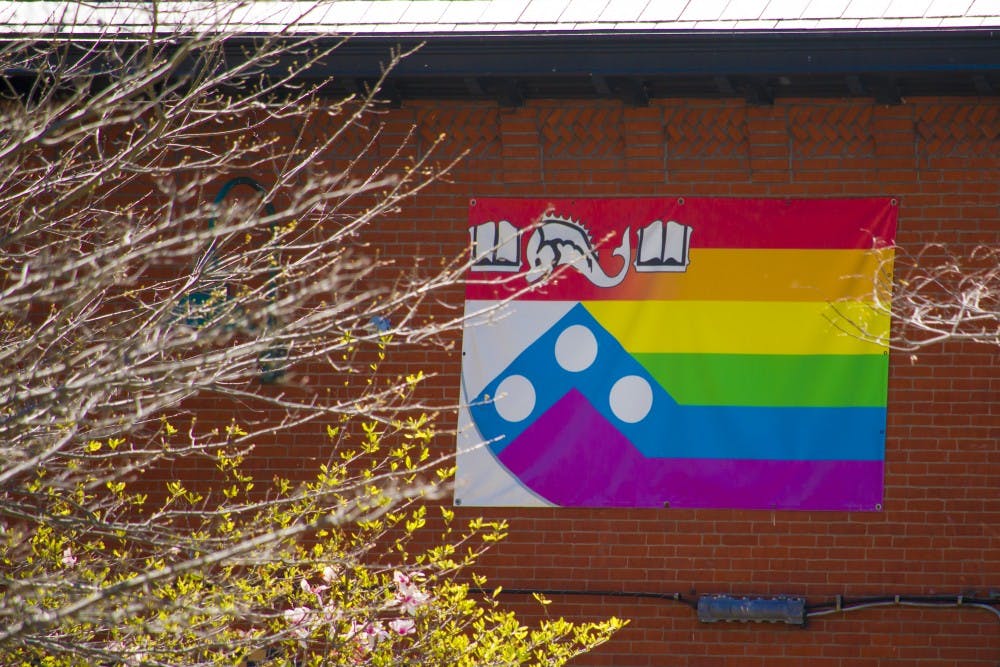
College freshman Julia Pan, Lambda Alliance's Vice-Chair of Outreach Programs, matched Penn student mentors with mentees.
Credit: Julio SosaIn early April, around 200 accepted LGBTQ students and allies received emails from members of Penn’s queer community, telling them about the wide variety of LGBTQ resources that Penn offers.
“I’m pretty sure Penn is one of the few schools that specifically recruits for LGBTQ people,” said College freshman Julia Pan, Lambda Alliance’s Vice-Chair of Outreach Programs. “So it’s a very queer-friendly school.”
Around the end of March, Jordan Pascucci, who serves as the Associate Dean of Recruitment for the Office of Admissions, sent Pan an Excel document with the names of both accepted early decision and regular decision LGBTQ-identified students.
Those who identified as allies of the LGBTQ community and were accepted early decision were emailed by mentors. Including allies in the regular decision list would have posed a challenge in terms of finding enough current students to email the prospective students, so only those who identified as LGBTQ in regular decision were emailed.
According to Pan, 64 current Penn students signed up to be “mentors.” On the flip side, 40 mentees were identified during the early decision round, and 160 were identified during the regular decision round. With allies included, the regular decision list would have encompassed 350 people.
Pan then matched “mentors” with “mentees,” taking into account similarities such as home state, gender, gender identity and sexual orientation. College sophomore and member of the Lambda Alliance board Sean Collins said that the program looks to match people who “have similar experiences in some manner. We hope that the mentor has some possible way of connecting to the mentee so that people who might want to be involved in a certain group [on campus] get matched with someone from that group.”
Pan believes it’s important to let students know about Penn’s vibrant queer community. “I think a lot of times, for LGBTQ students, something that’s most important to their identity is their LGBTQ status, so sending these emails shows them how involved the Penn queer community is,” she said. “Second of all, it gives them a personal resource that they wouldn’t be able to find through a website. It’s very important that people know that we’re there for them.”
Pan said that even if students choose not to respond to the emails, it’s beneficial for students to know about the resources in case they ever need them.
College freshman Cathy Zhang, who sent four emails, said that the program is an important way for prospective students “just to know that these communities exist when they’re coming in as a freshman.” She continued, “At least for me, joining these groups helped me meet a lot of new people that I feel like I have a lot in common with. So it’s not just for getting in touch with those groups, but also for really trying to know individuals who are like you and might shape your experience at Penn in a positive way.”
As with all programs, there is room for improvement. Pan wishes that the early decision list could have been sent to her during the first semester, so that emails could have been more timely. She is also looking for ways to increase response rate.
Collins recalls receiving an email from current College senior Eliana Yankelev when he was a senior in high school. “Talking to her really assured me that regardless of whatever I did at Penn, that there would be a right space for me,” he said.
The Daily Pennsylvanian is an independent, student-run newspaper. Please consider making a donation to support the coverage that shapes the University. Your generosity ensures a future of strong journalism at Penn.
DonatePlease note All comments are eligible for publication in The Daily Pennsylvanian.








